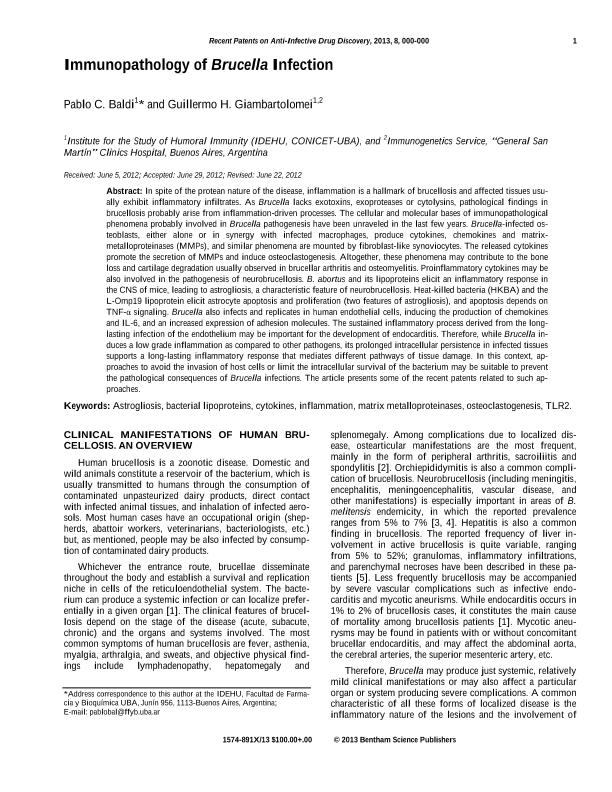Mostrar el registro sencillo del ítem
dc.contributor.author
Baldi, Pablo Cesar

dc.contributor.author
Giambartolomei, Guillermo Hernan

dc.date.available
2016-11-17T14:44:25Z
dc.date.issued
2013-02
dc.identifier.citation
Baldi, Pablo Cesar; Giambartolomei, Guillermo Hernan; Immunopathology of Brucella infection; Bentham Science Publishers; Recent patents on anti-infective drug discovery; 8; 1; 2-2013; 18-26
dc.identifier.issn
1574-891X
dc.identifier.uri
http://hdl.handle.net/11336/8283
dc.description.abstract
In spite of the protean nature of the disease, inflammation is a hallmark of brucellosis and affected tissues usually exhibit inflammatory infiltrates. As Brucella lacks exotoxins, exoproteases or cytolysins, pathological findings in brucellosis probably arise from inflammation-driven processes. The cellular and molecular bases of immunopathological phenomena probably involved in Brucella pathogenesis have been unraveled in the last few years. Brucella-infected osteoblasts, either alone or in synergy with infected macrophages, produce cytokines, chemokines and matrixmetalloproteinases (MMPs), and similar phenomena are mounted by fibroblast-like synoviocytes. The released cytokines promote the secretion of MMPs and induce osteoclastogenesis. Altogether, these phenomena may contribute to the bone loss and cartilage degradation usually observed in brucellar arthritis and osteomyelitis. Proinflammatory cytokines may be also involved in the pathogenesis of neurobrucellosis. B. abortus and its lipoproteins elicit an inflammatory response in the CNS of mice, leading to astrogliosis, a characteristic feature of neurobrucellosis. Heat-killed bacteria (HKBA) and the L-Omp19 lipoprotein elicit astrocyte apoptosis and proliferation (two features of astrogliosis), and apoptosis depends on TNF-α signaling. Brucella also infects and replicates in human endothelial cells, inducing the production of chemokines and IL-6, and an increased expression of adhesion molecules. The sustained inflammatory process derived from the longlasting infection of the endothelium may be important for the development of endocarditis. Therefore, while Brucella induces a low grade inflammation as compared to other pathogens, its prolonged intracellular persistence in infected tissues supports a long-lasting inflammatory response that mediates different pathways of tissue damage. In this context, approaches to avoid the invasion of host cells or limit the intracellular survival of the bacterium may be suitable to prevent the pathological consequences of Brucella infections. The article presents some of the recent patents related to such approaches.
dc.format
application/pdf
dc.language.iso
eng
dc.publisher
Bentham Science Publishers
dc.rights
info:eu-repo/semantics/openAccess
dc.rights.uri
https://creativecommons.org/licenses/by-nc-sa/2.5/ar/
dc.subject
Brucella
dc.subject
Immunopathology
dc.subject
Inflammation
dc.subject.classification
Biología Celular, Microbiología

dc.subject.classification
Ciencias Biológicas

dc.subject.classification
CIENCIAS NATURALES Y EXACTAS

dc.subject.classification
Inmunología

dc.subject.classification
Medicina Básica

dc.subject.classification
CIENCIAS MÉDICAS Y DE LA SALUD

dc.title
Immunopathology of Brucella infection
dc.type
info:eu-repo/semantics/article
dc.type
info:ar-repo/semantics/artículo
dc.type
info:eu-repo/semantics/publishedVersion
dc.date.updated
2016-11-10T13:49:59Z
dc.journal.volume
8
dc.journal.number
1
dc.journal.pagination
18-26
dc.journal.pais
Países Bajos

dc.journal.ciudad
Amsterdam
dc.description.fil
Fil: Baldi, Pablo Cesar. Consejo Nacional de Investigaciones Cientificas y Tecnicas. Oficina de Coordinacion Administrativa Houssay. Instituto de Estudios de la Inmunidad Humoral "Profesor R. A. Margni"; Argentina
dc.description.fil
Fil: Giambartolomei, Guillermo Hernan. Consejo Nacional de Investigaciones Cientificas y Tecnicas. Oficina de Coordinacion Administrativa Houssay. Instituto de Estudios de la Inmunidad Humoral "Profesor R. A. Margni"; Argentina. Universidad de Buenos Aires. Facultad de Medicina. Hospital de Clínicas General San Martín; Argentina
dc.journal.title
Recent patents on anti-infective drug discovery
dc.relation.alternativeid
info:eu-repo/semantics/altIdentifier/url/http://www.eurekaselect.com/107314/article
dc.relation.alternativeid
info:eu-repo/semantics/altIdentifier/doi/http://dx.doi.org/10.2174/1574891X11308010005
Archivos asociados
